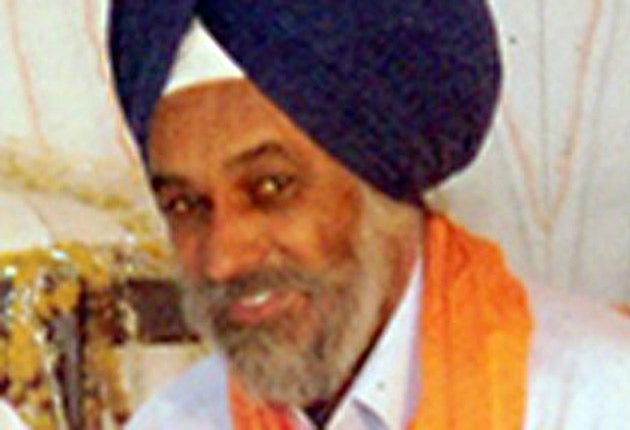Four Britons bailed over murder of politician in Punjab

On a Tuesday evening in July last year Rulda Singh, a controversial politician and businessman in the Indian town of Patiala, was shot dead on his doorstep.
Two men approached the 62-year-old as he parked outside his home and fired six bullets into the head and chest of their victim before fleeing with a driver in a waiting car. Singh's murder initially looked like a locally-organised hit. But in November, the Indian authorities began pointing the finger at Britain, where they accused proscribed Sikh militant group Babbar Khalsa International of plotting the assassination.
Indian investigators named two British men – Gursharanjit Singh and Manjeet Singh – as suspects while UK counter terrorism detectives flew out to the Punjab to conduct their own inquiries. This week, almost exactly a year after Rulda Singh's death, four people from the West Midlands were arrested on suspicion of the politician's murder. The men, aged between 27 and 36, were released on bail yesterday. It is unclear whether they are the individuals named by the Indian police.
Their arrests have shone a spotlight on the spectre of Sikh militancy in Britain, raising the question of whether the country still hosts a small number of separatists willing to use violence to create a Sikh homeland. Political murders are not unknown in the Punjab. The state was sliced in half by Partition, leading to the largest migration in history and an orgy of violence that continues to reverberate today.
During the 1970s and 1980s the state descended into vicious bloodletting between the Indian government and Sikh militants who wanted to create a separate state called Khalistan. In a crackdown on the Khalistanis, India's police and security forces committed numerous human rights violations which fed the separatist movement and caused anger among the Sikh diaspora. As militants stepped up their attacks, India routinely accused Britain and Canada of allowing militant groups to operate with relative impunity.
In 2001 the Home Office proscribed two Sikh nationalist groups, the International Sikh Youth Federation and Babbar Khalsa International. But many in the Sikh community say militants still have a presence in Britain.
"There's a militant strain and it hasn't gone away," said a Sikh writer. "There are some gurudwaras [Sikh temples] where militant martyrs are still honoured and young people are led astray by people who dream of creating Khalistan. The numbers are small but they are there." Sources in the Sikh community say Rulda Singh had created enemies among nationalists during a series of trips he made to Britain in the early 2000s.
He was head of the Rashtriya Sikh Sangat, the Sikh wing of a Hindu nationalist organisation linked with India's main opposition party, the Bharatiya Janata Party (BJP).
During the first half of the decade, when the BJP was last in power, Singh visited Britain to try to persuade Khalistanis to return to India. "He wasn't very well received," recalled a Sikh who asked to remain anonymous. "There was a lot of mistrust. In one gurudwara he was received with a garland of shoes."
West Midlands police declined to say yesterday whether the arrested men, from Smethwick and Coventry, are part of Babbar Khalsa International.
Detective Superintendent George Tracey, of the West Midlands' Counter Terrorism Unit, said: "The investigation into the death of Mr Singh is complex and ongoing here and in the Punjab."
Subscribe to Independent Premium to bookmark this article
Want to bookmark your favourite articles and stories to read or reference later? Start your Independent Premium subscription today.

Join our commenting forum
Join thought-provoking conversations, follow other Independent readers and see their replies